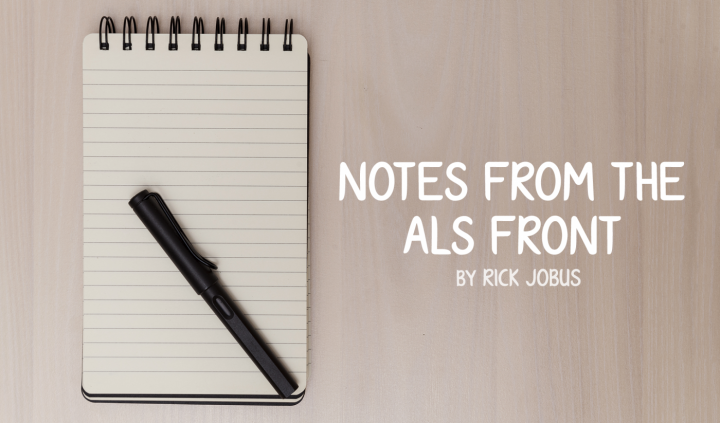How a Friend’s Strength Taught Me to Cope With ALS
Written by |

Photo by Shutterstock Dealing with ALS takes a positive outlook.
“It’s hard to make predictions … especially about the future.” –Yogi Berra
Gamblers and non-gaming speculators fervently seek out “sure things.” In the absence of that, both groups attempt to identify situations where probability weighs heavily in their favor. Some may conspire to unscrupulously influence the odds in their favor by employing techniques like stacking the deck, loading the dice, accessing inside information, or bribing officials.
Risk-averse folks likewise gravitate toward certainty. Almost universally, humankind will opt for a guiding light versus complete darkness.
ALS offers only one given. Death. Outside of that, it renders you completely blind. About 90 percent of those afflicted never see the locomotive hurtling toward them. Given that the cause and risk factors remain unknowns, pre-emptive preventive action is not a possibility.
Even those aware of the potential peril — the familiarly predisposed — never know, until after the fact, whether they will be heredity’s victim. The diagnosis is just an educated guess. There is no definitive test, only a battery of examinations to exclude all other explanations for the symptoms. In the absence of an assignable cause, ALS is assumed to be the culprit.
As if all of that weren’t bad enough, the pronouncement that you are likely to have ALS includes no accurate foretelling of what lies ahead, only broad generalities. One study suggested a predictive method with the following caveat: “The model may predict a median survival of as much as 4 years or as little as 8 months, and even less in patients with respiratory involvement. The true survival time falls between half and twice the median in about half of the patients.” Clear as mud. That analysis is either not well known, or not explicitly trusted by clinicians. In visits to six ALS clinics in four states, a prognostic has never been shared with me.
You cannot even turn to a fellow sufferer for a reliable rendering of what to expect. The heterogeneity of ALS precludes that. What one has experienced does not fully translate into a meaningful fortunetelling for anyone else. In many cases the disease progression will be vastly different: “With profound clinical, prognostic, neuropathological, and now genetic heterogeneity, the concept of ALS as one disease appears increasingly untenable.”
Among the few similarities to be counted on are the devastation when the damnable news is initially presented, the constant self-surveillance for signs of deterioration, and the coping with the loss of all semblance of a hoped-for destiny. To again quote Berra, “The future ain’t what it used to be.”
ALS is wicked.
Last week a couple of folks judged my article to be of the “feel-good” variety. Nothing could be further from my intent. Like many of my columns, it was merely an example of trying to cope. Not in any “here’s how” sort of way, but rather as acknowledgment of the importance of the effort, no matter the method one chooses. Suggested coping strategies abound. From general listings to specific ones, poignantly penned by people in the throes of a terminal illness, the menu options for distraction, diversion, channeling, and purposeful life are plentiful.
Admittedly, I do tend to be an optimistic sort. My default glass is half-full. Of course there are the unavoidable instances where the barkeep leaves my container half-empty. Not surprising, more so after the advent of ALS. Recently my pastor offered advice. Regardless of how the meniscus level is perceived, always strive to make the glass larger. Consciously increase the capacity to take in life. That is now a go-to weapon in my coping arsenal.
Plus, there is the matter of the promise I made to a man, Randy Watkins. Introduced at work in 1980, we became friendly hallway passersby and later genuine friends via a shared fondness of golf. He was diagnosed with ALS after I was, knew of my condition, and sought my advice relative to my atypically slow progression. We compared notes, commiserated, and dreamed of tee times upon the return of our health. In short, we propped each other up. For over three years, we were in contact at least once a week and often daily. Our friendship deepened immensely.
When he sensed that his days were dwindling, he asked that I make a pledge to his memory. His request: Keep battling, stay upbeat, and always seek the good.
He passed like he battled this horrid disease — determined to prevail, yet at peace with the timing and the adjudication of the outcome. Every day I celebrate the existence of a man who exemplified that triumph in life may be gauged by strength of character, resolve to do what is right, love of others, and coping with all that life deals you. Randy is the epitome of a winner.
His example of courage, graciousness, persistence, and perspective helps me cope.
***
Note: ALS News Today is strictly a news and information website about the disease. It does not provide medical advice, diagnosis, or treatment. This content is not intended to be a substitute for professional medical advice, diagnosis, or treatment. Always seek the advice of your physician or other qualified health provider with any questions you may have regarding a medical condition. Never disregard professional medical advice or delay in seeking it because of something you have read on this website. The opinions expressed in this column are not those of ALS News Today or its parent company, Bionews Services, and are intended to spark discussion about issues pertaining to ALS.







Kip Heinzmann
Thanks for sharing Rick. I love the idea of a bigger glass
#KeepItPositive
Gary Gehiere
Like panning for gold, you take us from carrying a diverse collection of feelings, facts, opinions and unknowns to discover then cherish true, lasting values, for ourselves and for those who will follow. So we keep panning, sluicing away the debris and looking for the gold. Thank you Rick for that timely encouragement today.
Dagmar
BRAVO Rick!!!!
Bountiful
Hi Rick,
Once again...great writing. In another article you called als a serial killer & now wicked. Beautiful writing...you’ve hit the nail on the head...
You express pals feelings that we can all relate to....sprinkled with a bit of sunshine.
Kudos & in gratitude
Bountiful
Sonia
Just beautiful
Go Rick and all my sisters and brothers
Big hug with love
Sonia
Cynthia Gregg
Thank you for your sharing these words!
Every day is a blessing and All My Hope is in Jesus!?
dino
The Most Powerful Activist in America Is Dying
Over the past 15 months Barkan has emerged as one of the most compelling figures of the new activist left. At age 35, with a 2-year-old son, he is dying of amyotrophic lateral sclerosis, or ALS, a disease with no cure. As the disease rapidly progresses, he has managed to turn his body into a kind of campaign tool, laying it in front of members of Congress, news cameras and activists to inspire action for health care, immigrants and the election of progressive Democrats like Alexandria Ocasio-Cortez.
He first came to national attention with the 2014 Fed Up campaign, which took a very narrow but specific policy goal: to diversify the regional boards of the Federal Reserve, pressuring the Fed to keep interest rates low in part by considering the interests of working people, not just finance-sector millionaires.
There just wasn’t much to be done. Barkan was seeing two neurologists, one a clinician, another involved in cutting-edge research. “Both of them are wonderful. And both of them are almost entirely useless to me,” he said. As for edaravone (which FDA approved in May 2017), “it doesn’t do anything as far as I can tell.”
As it is for many chronically ill Americans, fighting his own health insurer was part of Barkan’s struggle, one that he quite openly joined to his larger political struggle. HealthNet, which offered coverage through King’s job, initially refused to pay for a ventilator or for edaravone. After Barkan raised a fuss, it backed down, but he sued them anyway, in a class action filed in June.
“I did it because this is how they do business—deny, deny, delay, and then people give up,” Barkan said. “We want them to change their practices, and we also want to make the political case for single payer.”
HealthNet tried to get the lawsuit dismissed with forced arbitration, but in November, a judge ruled the case could go to trial.
In the end stages of ALS, a ventilator is required because the patient’s breathing muscles fail. In Japan, one study showed that 45 percent of ALS patients stay alive on ventilators; in the U.S. only 20 percent. That’s because being on a ventilator requires full-time nursing care to prevent infections, which are what kill ALS patients at that stage. Insurance doesn’t cover them, King explains, “so you have to decide whether to bankrupt your family or give up living longer. It’s another example of how broken our system is.”
https://www.politico.com/magazine/story/2019/03/24/ady-barkan-activist-als-226105
Lisa Cross
Thank you Rick. I have always had the luxury of a half full glass, but now I am looking for a bigger glass!
Laurie Burnell
My sister in law just got the initial diagnosis last Thursday and today they are saying, it is Bulbar ALS. We are all devastated. How best can family help, how do you cope?
Rick Jobus
Laurie, first I am sorry to learn of your sister-in-law. If there is any way you think that I can ever help, just reach out. As far as coping my greatest source comes from my faith, which I've written about:
http://alsnewstoday.com/2018/06/20/als-keeping-faith-alive-challenges/
Here is a summation of what I went through early on:
http://alsnewstoday.com/2019/01/30/poem-als-diagnosis-lost-confused/
For family, always strive to see the beautiful person your sister-in-law is, and not this horrid disease. When she is upbeat, follow her lead. If she becomes downtrodden, give her time to grieve, but then help prop her back up. Always know that she is more worried about her survivors than she is about herself. Involve her in everything that you can.
I'll be praying.
Paul Lyons
Rick,
You and Dagmar are such inspirations. Thank you for sharing your uplifting thoughts!
John Russell
I find the thoughts of both you and Dagmar Munn very helpful. I have a relatively slow progression and have been OK so far, (many thanks to friends who have included me despite the effort required to haul me along). With yr. 5 looming however I have found myself dwelling on declines, real and imagined. I wonder when and how this ends. I am considering dropping my quarterly visit to clinic. While it is good to spend time with caring professionals, at the end of the day I leave with estimates and measurements of decline yet no actual prognosis or hopeful treatment.
I would like to just stay in the moment and look forward to today as I have been pretty good at until recently. This article has been helpful in improving my thoughts.
Bob
Rick your joy and gentleness is evident to your readers and those around you. Trust in Jesus eliminates worry and anxiety. He is near!!! referring to the rapture. I long to see Him. May His peace guard your soul and give you tranquility through your journey.